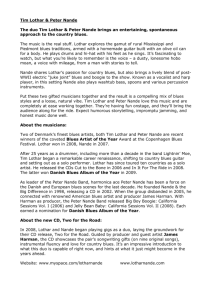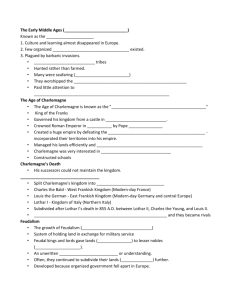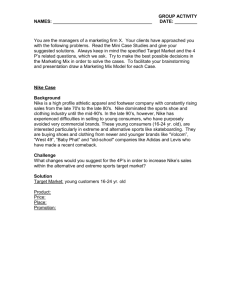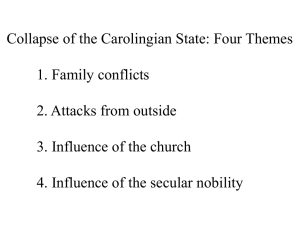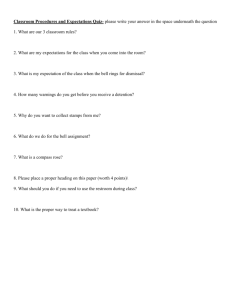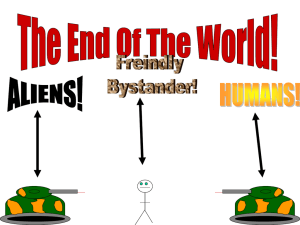Power Papers designation: 2639/Activities
advertisement
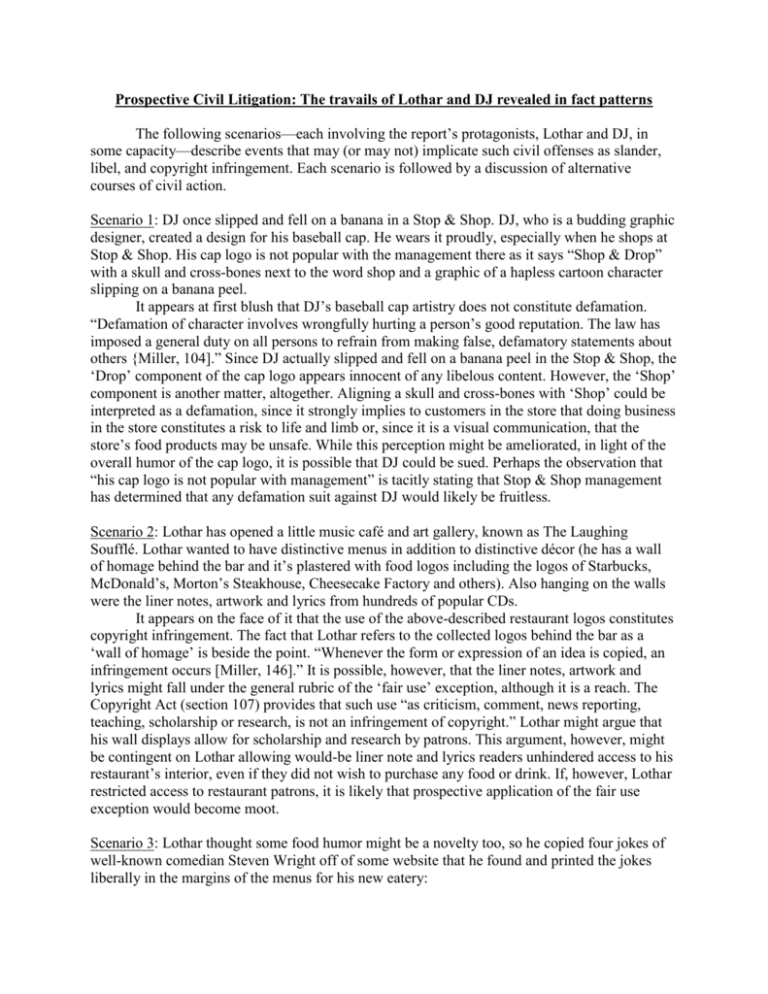
Prospective Civil Litigation: The travails of Lothar and DJ revealed in fact patterns
The following scenarios—each involving the report’s protagonists, Lothar and DJ, in
some capacity—describe events that may (or may not) implicate such civil offenses as slander,
libel, and copyright infringement. Each scenario is followed by a discussion of alternative
courses of civil action.
Scenario 1: DJ once slipped and fell on a banana in a Stop & Shop. DJ, who is a budding graphic
designer, created a design for his baseball cap. He wears it proudly, especially when he shops at
Stop & Shop. His cap logo is not popular with the management there as it says “Shop & Drop”
with a skull and cross-bones next to the word shop and a graphic of a hapless cartoon character
slipping on a banana peel.
It appears at first blush that DJ’s baseball cap artistry does not constitute defamation.
“Defamation of character involves wrongfully hurting a person’s good reputation. The law has
imposed a general duty on all persons to refrain from making false, defamatory statements about
others {Miller, 104].” Since DJ actually slipped and fell on a banana peel in the Stop & Shop, the
‘Drop’ component of the cap logo appears innocent of any libelous content. However, the ‘Shop’
component is another matter, altogether. Aligning a skull and cross-bones with ‘Shop’ could be
interpreted as a defamation, since it strongly implies to customers in the store that doing business
in the store constitutes a risk to life and limb or, since it is a visual communication, that the
store’s food products may be unsafe. While this perception might be ameliorated, in light of the
overall humor of the cap logo, it is possible that DJ could be sued. Perhaps the observation that
“his cap logo is not popular with management” is tacitly stating that Stop & Shop management
has determined that any defamation suit against DJ would likely be fruitless.
Scenario 2: Lothar has opened a little music café and art gallery, known as The Laughing
Soufflé. Lothar wanted to have distinctive menus in addition to distinctive décor (he has a wall
of homage behind the bar and it’s plastered with food logos including the logos of Starbucks,
McDonald’s, Morton’s Steakhouse, Cheesecake Factory and others). Also hanging on the walls
were the liner notes, artwork and lyrics from hundreds of popular CDs.
It appears on the face of it that the use of the above-described restaurant logos constitutes
copyright infringement. The fact that Lothar refers to the collected logos behind the bar as a
‘wall of homage’ is beside the point. “Whenever the form or expression of an idea is copied, an
infringement occurs [Miller, 146].” It is possible, however, that the liner notes, artwork and
lyrics might fall under the general rubric of the ‘fair use’ exception, although it is a reach. The
Copyright Act (section 107) provides that such use “as criticism, comment, news reporting,
teaching, scholarship or research, is not an infringement of copyright.” Lothar might argue that
his wall displays allow for scholarship and research by patrons. This argument, however, might
be contingent on Lothar allowing would-be liner note and lyrics readers unhindered access to his
restaurant’s interior, even if they did not wish to purchase any food or drink. If, however, Lothar
restricted access to restaurant patrons, it is likely that prospective application of the fair use
exception would become moot.
Scenario 3: Lothar thought some food humor might be a novelty too, so he copied four jokes of
well-known comedian Steven Wright off of some website that he found and printed the jokes
liberally in the margins of the menus for his new eatery:
[a] “If toast always lands butter-side down, and cats always land on their feet, what happens if
you strap toast on the back of a cat and drop it?”
[b] “Is it true cannibals don’t eat clowns because they taste funny?”
[c] “I've got some powdered water, but I don't know what to add.”
[d] “I put instant coffee in my microwave oven and almost went back in time.”
Lothar’s use of some of comedian Steven Wright’s published one-liners on Laughing
Souffle menus may be in poor taste [pun alert], but their use likely does not contravene the
copyright laws. First, they are unlikely to be original with Steven Wright. The butter-side (or,
more commonly, jelly-side) down joke was a staple in 19th century vaudeville. Cannibals/clowns
and ‘powdered water’ are probably almost as old. The problem arises out of the fact that Lothar
copied the jokes verbatim from a website (a copyright protected source, provided the original
material was subject to copyright). However, The Copyright Act lists a number of categories of
material falling under the protection of the Act, none of which appear to lend themselves to
Wright’s joke collection. Section 103 of the Act allows for the copyright of compilations.
However, the compiled material must exhibit a measure of unity “in such a way that the resulting
work as a whole constitutes an original work of authorship [Act, Section 103].”
If Wright’s work were nonetheless deemed protected by copyright, if he published his
collected jokes on a website without a stipulation that any further use for commercial purposes or
without proper attribution, it follows that Lothar did not commit an infringement in using them.
If Wright simply required attribution, then Lothar’s use of the material would be legitimate, as
long as he credited Wright. If commercial application of the material were expressly forbidden,
Lothar could likely defend his application of the material by pointing to alternative sources that
were identical or substantially the same. Finally, the value of Wright’s copyright rests primarily
in the material as a collected body, rather than as individual one-liners. Since Lothar printed
them ‘in the margins of the menus for his new eatery,’ Lothar does not appear to be undermining
Wright’s copyright.
Scenario 4: Lothar and DJ, who are also aspiring songwriters, wrote a song together entitled
Taco Bell’s Canon in E Major which is played regularly for the patrons. One could describe the
lyrics as ‘spicy.’ Actually, they wrote the music and hired one of Lothar’s bartenders to write the
lyrics and paid him $50.00. The song is so popular that Lothar decided to sell T-shirts, both in
the store and on his website, that say on the back, “Taco Bell’s Canon at the Laughing Soufflé.”
Lothar had the lyrics printed on the front and back of the T-shirt and the shirts are selling like
hotcakes; Lothar keeps all the money earned for himself, of course.
Copyright is a common-law right. It appears from the scenario that the bartender who
penned the lyrics sold the copyright to Lothar and DJ for $50, making the latter pair both
copyright owners and, as a consequence, solely responsible for use of the lyrics. To what extent
the lyrics of Taco Bell’s Canon in E Major actually defame Taco Bell would require their
examination. However, “the tort of defamation arises when a false statement is made about a
person’s product, business, or title to property [Miller, 104].” Thus, if the song were to include
language stating that Taco Bell products contained adulterated meat or vegetables—and that
allegation could not be verified—it is likely that Lothar and DJ would be open to a libel suit.
There is also the problem of copyright infringement.
The ‘Taco Bell’ brand is of great value in itself and any use of it by someone else for the
financial advantage of the latter constitutes a Copyright Act violation. Penalties “range from
actual damages or statutory damages, imposed at the court’s discretion, to criminal proceedings
for willful violations [Miller, 106].” Since Taco Bell did not authorize Lothar and DJ to use its
company name in the Lothar/DJ commercial venture, and because Lothar is retaining all the
profits from T-shirt sales carrying the lyrics of Taco Bell’s Canon in E Major, it appears that
Taco Bell has a claim on any income derived from those sales.
Since, according to the scenario, both Lothar and DJ paid the bartender to write the lyrics,
it appears, absent some business arrangement not detailed in the scenario, that both Lothar and
DJ have equal rights in income derived from T-shirt sales, even if the decision to sell T-shirts
imprinted with the song lyrics originated in Lothar and not both restaurant partners.
Scenario 5: Lothar and DJ also though it would be a great idea to sell a “Taco Bell’s Canon
Burger” at the Laughing Soufflé. They already sell a “HappyBucks Espresso” which is much
cheaper than a Starbucks espresso. Lothar loves burgers so much that he hung a miniature golden
arch (like the one at McDonald’s) just inside the front door of the restaurant.
According the Miller and Jentz, “Whenever the form or expression of an idea is copied,
an infringement of copyright occurs. The reproduction does not have to be exactly the same as
the original, nor does it have to reproduce the original in its entirety. If a substantial part of the
original is reproduced, there is copyright infringement [146].” However, there are a number of
‘fair use’ exceptions to the general rule. Most of these apply to either education or news
reporting. However, the courts interpret fair use on a case by case basis, with “effect of the use
upon the potential market for or value of the copyrighted work [Miller, 147].” It might be argued
that ‘HappyBucks’ constitutes infringement, if only because ostensibly reproduces Starbucks’
copyrighted name in part. However, since the ‘HappyBucks Espresso’ refers to the low cost of
the product, rather than (arguably) to Starbucks Expresso, it is doubtful that HappyBucks
constitutes copyright infringement. However, the Copyright Act (section 107) lists ‘criticism’ as
a legitimate purpose. Lothar and DJ could argue, perhaps not too convincingly, that their use of
‘HappyBucks’ was an act of ongoing visual social criticism. In any event, it is difficult to
envision a court holding that the ‘HappyBucks’ locution could have even a minimal impact on
the market or value of the Starbucks name. However, the direct use of the copyrighted Taco Bell
business name and the copyrighted McDonald’s golden arch—the ‘reproduction [of which] does
not have to be exactly the same as the original’—appears to clearly infringe on copyright. Insofar
as fair use is concerned, the problem does not lie so much in the business activities of Lothar and
DJ (whose impact on the larger corporations would likely be minimal) but, rather, that if Taco
Bell and McDonald’s knowingly allowed such infringement to continue unchallenged, their
copyrights might well come under challenge (as, for example, happened in the case of
‘cellophane,’ decades ago). In any event, Lother and DJ cannot rely on the fair use doctrine.
Scenario 6: On the Laughing Soufflé’s website blog, Lothar has a tendency to go on and on
about things such as how much better his burgers are than everyone else’s. He also made a
statement that “DJ once worked at Taco Bell and regularly stole money from the cash register
because he was angry that their food was so fake tasting.” This accusation made D.J. so angry
that he revealed on the Laughing Soufflé’s website blog that Lothar was once arrested during
spring break in South Florida, for trying to ride on the back of a manatee in a canal after a night
of hard partying.
Defamation of character involves wrongfully hurting a person’s good reputation.
Breaching this duty orally involves the tort of slander; breaching it in writing involves the tort of
libel [Miller, 104]. Published defamatory statements, including those published on websites,
implicate the tort of libel. Establishing a defense in cases of libel is the responsibility of the
accuser (defendant). “Truth is normally an absolute defense against a defamation charge. In other
words, if the defendant in a defamation suit can prove that his or her allegedly defamatory
statements were true, the defendant will not be liable [Miller, 105]. Thus, should DJ bring suit
against Lothar, alleging libel on the latter’s part, it would fall to Lothar to demonstrate the truth
of the allegation (e.g., by presenting Taco Bell company documents to that effect or, perhaps,
criminal court documentation). DJ’s allegation is perhaps more convoluted. Should Lothar bring
a libel suit against DJ, the latter would have an absolute defense if he could present court
documentation to that effect. However, context might play a role in the matter. If, for example,
the statement was actually one of a number of bizarre and well-nigh unbelievable acts—ones
intended as low humor rather than any reportage of actual events—it is possible that the court
simply dismiss the case out of hand. (For example, it might be demonstrated that attempting to
ride a manatee in a Florida canal, however foolish, does not constitute a specific offense under
the state’s criminal code and, therefore, would almost certainly not have resulted in a criminal
complaint.)
Sources consulted in the preparation of these scenario essay responses
Miller, Roger L & Jentz, Gaylord A, Business Law Today, 7th edition, (Mason [OH]: Thomson
West, 2006, 1081pp)
